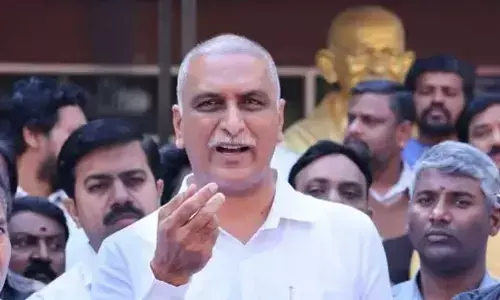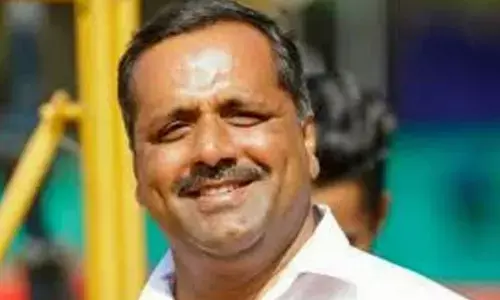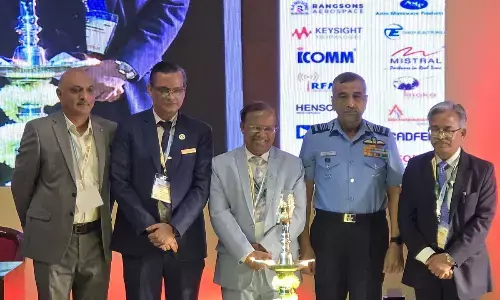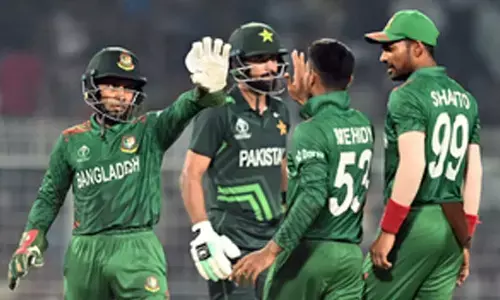Preparations begin for Kaloji birth centenary

Preparations are being made to celebrate the birth centenary of Kaloji Narayana Rao, popularly known as ‘Praja Kavi’ Kaloji (People’s poet) from September 9 to September 9, 2014. A meeting will be held at Warangal on September 9, the 99th birth anniversary, and the last meeting will be held at Hyderabad on September 9 next year. Meetings and seminars on Kaloji’s writings at different places in many districts of Telangana and Andhra will be held throughout the year to take the message of Kaloji to all Telugu-speaking people.
Though Kaloji welcomed formation of Andhra Pradesh in 1956, he was happy that all Telugu-speaking people were under one roof. But very soon he was greatly disillusioned. Then he supported the 1969 movement for a separate State of Telangana
.jpg) Preparations are being made to celebrate the birth centenary of Kaloji Narayana Rao, popularly known as ‘Praja Kavi’ Kaloji (People’s poet) from September 9 to September 9, 2014. A meeting will be held at Warangal on September 9, the 99th birth anniversary, and the last meeting will be held at Hyderabad on September 9 next year. Meetings and seminars on Kaloji’s writings at different places in many districts of Telangana and Andhra will be held throughout the year to take the message of Kaloji to all Telugu-speaking people. The recently formed birth centenary committee wants to introduce Kaloji to all lovers of literature, particularly the youth. First and foremost, Kaloji was a poet whose first anthology, ‘Naa Godava’ (My concern) was first published in 1952. The title reveals his concern was common people. Kaloji strove to mitigate their sufferings. Kaloji sang the agonies and ecstasies of common people, never used difficult words; his diction was very simple. Therefore, he was known as a people’s poet.
Preparations are being made to celebrate the birth centenary of Kaloji Narayana Rao, popularly known as ‘Praja Kavi’ Kaloji (People’s poet) from September 9 to September 9, 2014. A meeting will be held at Warangal on September 9, the 99th birth anniversary, and the last meeting will be held at Hyderabad on September 9 next year. Meetings and seminars on Kaloji’s writings at different places in many districts of Telangana and Andhra will be held throughout the year to take the message of Kaloji to all Telugu-speaking people. The recently formed birth centenary committee wants to introduce Kaloji to all lovers of literature, particularly the youth. First and foremost, Kaloji was a poet whose first anthology, ‘Naa Godava’ (My concern) was first published in 1952. The title reveals his concern was common people. Kaloji strove to mitigate their sufferings. Kaloji sang the agonies and ecstasies of common people, never used difficult words; his diction was very simple. Therefore, he was known as a people’s poet.
His mini poem on Jayaprakash Narayan reads:
Birth is his...
Death is his...
But his entire life is the country’s.
In another poem, he says:
To think that there won’t be
Sunrise at all is pessimism
To think that there won’t be
Sunset at all is bad faith.
Again:
Terrible hunger is at one place
Lot of food at another place
Or:
“A simple drop of ink
That makes millions of people think,” said Byron. But is it true?
I have poured drums of ink
But there seems to be no thinking in anybody.
If poetry was one facet of Kaloji’s life, social activism was another. Since his college days, Kaloji participated in social reforms. Though he was trained as a lawyer during his student days, he never practiced law. His heart was always in movements against injustice to common people. Time and again, he would say he worshipped the man who fought against injustice.
Kaloji joined movements led by Madapati Hanumantha Rao, Suravaram Pratap Reddy, Gadicherla Hari Sarvothama Rao, Kodati Narayana Rao, Vattikota Alwar Swamy, Ravi Narayana Reddy. Those stalwarts were responsible for renaissance in Telangana during the 1920s and 1930s. They led the movement for revival of Telugu language and literature during Nizam’s rule. Urdu was the official language and it alone was allowed to flourish; Telugu, spoken by 85% of the people, was suppressed. Kaloji and others fought against this injustice. Through the Andhra Mahasabha, library movement, Arya Samajist movement in which Kaloji actively participated, the glory of Telugu could be revived.
Though Kaloji welcomed formation of Andhra Pradesh in 1956, very soon he was greatly disillusioned. In the beginning, he was happy that all Telugu-speaking people were under one roof. But when some of the arguments like Gentlemen’s Agreement which was evolved for safeguarding interests of backward Telangana were thrown to the winds by Andhra leaders, Kaloji was shocked. Then he supported the 1969 movement for a separate State of Telangana.

Kaloji remained a true democrat throughout his life. He was a great advocate of individual freedom who believed that everybody had a right to disagree with the ruling establishment; that it was against the spirit of democracy to dub a dissenter a terrorist or a Maoist. He condemned political parties as dictatorial when they tried to throttle the voices of the members of their parties in the name of party discipline or by orders of the high command. Even members of the political parties should be allowed to disagree with the official line of their party if they think that the official party line is not correct, Kaloji argued. On such occasions he looked like an anarchist.
The greatness of Kaloji is that his life and ideology matched each other. Born to a Maharashtrian father and a Kannada mother in Karnataka, Kaloji was a linguist. His father migrated to Warangal when he found a job there.
During the birth centenary celebrations, a documentary film is proposed to be shot. His writings will be brought out in seven volumes. A photo exhibition with 300 rare photographs of Kaloji is being planned. B. Narsinga Rao, the famous cine director, will make the celebrations memorable. Others like S.Jeevan Kumar, Human rights activist, and executive committee members of Kaloji Foundation, Warangal and Hyderabad, are joining he efforts.
www.ampashayyanaveen.com








